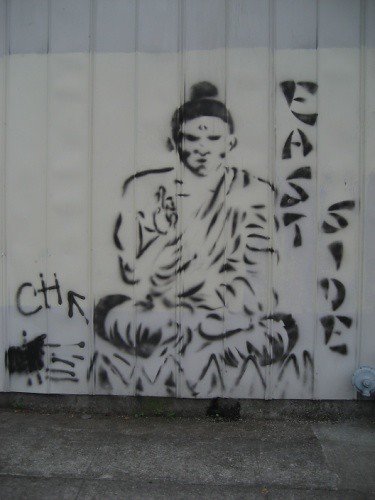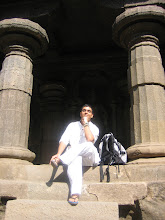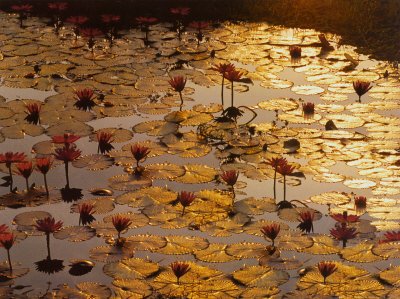Harmony of Difference and Equality
The mind of the great sage of India
is intimately communicated from west to east.
While human faculties are sharp or dull,
The Way has no northern or southern ancestors.
The spiritual source shines clear in the light;
the branching streams flow on in the dark.
Grasping at things is surely delusion;
according with sameness is still not enlightenment.
All the objects of the senses
interact and yet do not.
Interacting brings involvement.
Otherwise, each keeps its place.
Sights vary in quality and form,
sounds differ as pleasing or harsh.
Refined and common speech come together in the dark,
clear and murky phrases are distinguished in the light.
The four elements return to their natures
just as a child turns to its mother.
Fire heats, wind moves,
water wets, earth is solid.
Eye and sights, ear and sounds,
nose and smells, tongue and tastes;
Thus with each and every thing,
depending on these roots, the leaves spread forth.
Trunk and branches share the essence;
revered and common, each has its speech.
In the light there is darkness,
but don't take it as darkness;
In the dark there is light,
but don't see it as light.
Light and darkness oppose one another
like front and back foot in walking.
Each of the myriad things has its merit,
expressed according to function and place.
Phenomena exist; box and lid fit.
Principle responds; arrow points meet.
Hearing the words, understand the meaning;
don't set up standards of your own.
If you don't understand the Way right before you,
how will you know the path as you walk?
Progress is not a matter of far or near,
but if you are confused, mountains and rivers block your way.
I respectfully urge your who study the mystery,
do not pass your days and nights in vain.
- Shitou Xiquian - 石頭希遷
Translated by Taigen Dan Leighton, Carl Bielefeldt, Griffith Foulk, and Shohaku Okamura.
Saturday, February 28, 2009
Saturday, February 21, 2009
Eight Verses on Training the Mind
With a determination to accomplish
The highest welfare for all sentient beings
Who surpass even a wish-granting jewel
I will learn to hold them supremely dear.
Whenever I associate with others I will learn
To think of myself as the lowest among all
And respectfully hold others to be supreme
From the very depths of my heart.
In all actions I will learn to search into my mind
And as soon as an afflictive emotion arises
Endangering myself and others
Will firmly face and avert it.
I will learn to cherish beings of bad nature
And those oppressed by strong sins and suffering
As if I had found a precious
Treasure very difficult to find.
When others out of jealousy treat me badly
With abuse, slander, and so on,
I will learn to take on all loss,
And offer victory to them.
When one whom I have benefited with great hope
Unreasonably hurts me very badly,
I will learn to view that person
As an excellent spiritual guide.
In short, I will learn to offer to everyone without exception
All help and happiness directly and indirectly
And respectfully take upon myself
All harm and suffering of my mothers.
I will learn to keep all these practices
Undefiled by the stains of the eight worldly conceptions
And by understanding all phenomena as like illusions
Be released from the bondage of attachment.
-Geshe Langri Thangpa
The highest welfare for all sentient beings
Who surpass even a wish-granting jewel
I will learn to hold them supremely dear.
Whenever I associate with others I will learn
To think of myself as the lowest among all
And respectfully hold others to be supreme
From the very depths of my heart.
In all actions I will learn to search into my mind
And as soon as an afflictive emotion arises
Endangering myself and others
Will firmly face and avert it.
I will learn to cherish beings of bad nature
And those oppressed by strong sins and suffering
As if I had found a precious
Treasure very difficult to find.
When others out of jealousy treat me badly
With abuse, slander, and so on,
I will learn to take on all loss,
And offer victory to them.
When one whom I have benefited with great hope
Unreasonably hurts me very badly,
I will learn to view that person
As an excellent spiritual guide.
In short, I will learn to offer to everyone without exception
All help and happiness directly and indirectly
And respectfully take upon myself
All harm and suffering of my mothers.
I will learn to keep all these practices
Undefiled by the stains of the eight worldly conceptions
And by understanding all phenomena as like illusions
Be released from the bondage of attachment.
-Geshe Langri Thangpa
Monday, February 16, 2009
Yo Sootraaz R Punk! (Part I)
One of the things that inspired me to create this blog is the uniqueness as well as the challenge of practicing Buddhism in the modern age, particularly outside of traditionally non-Buddhist places. One big issue is the "melting pot" phenomena. Historically, many traditions were isolated from each other by geography. Nowadays, you can easy chat with a lama on a Blackberry while walking from a vipassana sitting to a zazen retreat. In an earlier post, I made mention of my own ways of trying to approach the smorgasbord of Dharma gates.
In the Spring 2009 issue of Buddhadharma, scholar and Shambhala teacher Rita Gross, discusses this very same topic in a short essay called "Why We Need to Know our Buddhist History". Her thoughts on the matter happen to match up almost exactly with my own. An excerpt of the article (provided below) is also available online
 A while back, I was discussing the topic of sutras authenticity with some Dharma friends when one of them pointed out something interesting about Chinese Buddhism. The three texts which are perhaps the most influential in the Chinese traditions are the Awakening of Faith, the Sutra of Complete Enlightenment, and the Shurangama Sutra. These texts, are also quite possibly "apocryphal".
A while back, I was discussing the topic of sutras authenticity with some Dharma friends when one of them pointed out something interesting about Chinese Buddhism. The three texts which are perhaps the most influential in the Chinese traditions are the Awakening of Faith, the Sutra of Complete Enlightenment, and the Shurangama Sutra. These texts, are also quite possibly "apocryphal".
Professor Jan Nattier, in a famous paper, put forth the theory that the Heart Sutra is actually a Chinese composition compiled from Indian sources. This theory has gained popularity among some although my personal belief is that it's NOT a Chinese composition but wholly Indian (See Bill Porter's(Red Pine's) discussion/refutation of this theory in his translation/commentary of the Heart Sutra). A good point that I'll come back to later was made by another good friend of mine who said of the Heart Sutra, "I don't care where it came from, it's an amazing, powerful, and awesome text". Heck yea.
Arguments over authenticity are nothing new. The question for Google-enabled, Amazon.com one-click purchasing, Wikimaniac Dharma practitioners is how to constructively deal with "The Sutra Problem". Although people have been debating/arguing these points ad nauseum since the time of the Buddha himself, this issue is particularly prominent in an age where we the ability to easy explore (or jump around if you prefer) different traditions.
I won't be so bold as to put forth a definitive answer or approach to The Sutra Problem. What I can do is share my experiences and throw out some thinking points that might be useful when swimming through oceans of scriptures...
In the Spring 2009 issue of Buddhadharma, scholar and Shambhala teacher Rita Gross, discusses this very same topic in a short essay called "Why We Need to Know our Buddhist History". Her thoughts on the matter happen to match up almost exactly with my own. An excerpt of the article (provided below) is also available online
Western convert Buddhists may know a few “family” legends unique to the particular type of Buddhism they practice, but many lack systematic training in the history of their newly chosen religious path. Many do not understand how their chosen lineage fits into the larger picture of Buddhism, an old, far-flung religion with many regional and historical variations. Each of the myriad Buddhist subgroups has its own story about how, when, and where Buddha gave the teachings on which its view and practices are based. These stories make claims that are difficult to reconcile with one another. Making sense of these stories can be difficult unless one has tools with which to understand the relevance of legend and myth.
The Dalai Lama has argued for years that Buddhism and modern science are compatible and that if science could definitely disprove some traditional Buddhist assertion, Buddhism would have to accommodate the new information. I would make the same arguments regarding modern historical knowledge. In its traditional literature, no form of Buddhism possesses a complete account of Buddhism’s entire historical development and its various cultural and sectarian permutations. This means that without some input from modern historical studies, no form of Buddhism can provide accurate historical knowledge for its practitioners.
All forms of Buddhism can welcome historical study as relevant and useful. Buddhist teachings have always told us that impermanence is a great, unalterable fact of our experience and that it is crucial for us to become comfortable with that fact. History is simply the study of how things change and develop, which is to say that history studies changing institutions and ideas. History studies impermanence, including the impermanent characteristic of Buddhist institutions, practices, philosophical systems, and sacred narratives.
Some practitioners claim that historical knowledge is irrelevant to them because they only want to meditate. But without knowledge of Buddhism’s rich and diverse history, practitioners and communities are vulnerable to fundamentalism and sectarianism. They assume that sacred narratives and legends are composed of historical facts and that the familiar stories found in their specific Buddhist tradition should be taken literally. Those accounts often contain a sectarian edge. They claim special relevance—based on tales of miraculous accomplishments—for the texts and teachers associated with a specific Buddhist tradition. While asserting superiority for their favorite form of Buddhism, these tales denigrate other forms of Buddhism...
 A while back, I was discussing the topic of sutras authenticity with some Dharma friends when one of them pointed out something interesting about Chinese Buddhism. The three texts which are perhaps the most influential in the Chinese traditions are the Awakening of Faith, the Sutra of Complete Enlightenment, and the Shurangama Sutra. These texts, are also quite possibly "apocryphal".
A while back, I was discussing the topic of sutras authenticity with some Dharma friends when one of them pointed out something interesting about Chinese Buddhism. The three texts which are perhaps the most influential in the Chinese traditions are the Awakening of Faith, the Sutra of Complete Enlightenment, and the Shurangama Sutra. These texts, are also quite possibly "apocryphal".Professor Jan Nattier, in a famous paper, put forth the theory that the Heart Sutra is actually a Chinese composition compiled from Indian sources. This theory has gained popularity among some although my personal belief is that it's NOT a Chinese composition but wholly Indian (See Bill Porter's(Red Pine's) discussion/refutation of this theory in his translation/commentary of the Heart Sutra). A good point that I'll come back to later was made by another good friend of mine who said of the Heart Sutra, "I don't care where it came from, it's an amazing, powerful, and awesome text". Heck yea.
Arguments over authenticity are nothing new. The question for Google-enabled, Amazon.com one-click purchasing, Wikimaniac Dharma practitioners is how to constructively deal with "The Sutra Problem". Although people have been debating/arguing these points ad nauseum since the time of the Buddha himself, this issue is particularly prominent in an age where we the ability to easy explore (or jump around if you prefer) different traditions.
I won't be so bold as to put forth a definitive answer or approach to The Sutra Problem. What I can do is share my experiences and throw out some thinking points that might be useful when swimming through oceans of scriptures...
Saturday, February 14, 2009
Two Thoughts on Love
Love After Love
The time will come
when, with elation,
you will greet yourself arriving
at your own door, in your own mirror,
and each will smile at the other's welcome,
And say, sit here. Eat.
You will love again the stranger who was yourself.
Give wine. Give bread. Give back your heart
to itself, to the stranger who has loved you
all your life, whom you ignored
for another, who knows you by heart.
Take down the love letters from the bookshelf,
the photographs, the desperate notes,
peel your own image from the mirror.
Sit. Feast on your life.
-Derek Walcott
Thanks to Alison for sharing!
AND
Precious Garland
The time will come
when, with elation,
you will greet yourself arriving
at your own door, in your own mirror,
and each will smile at the other's welcome,
And say, sit here. Eat.
You will love again the stranger who was yourself.
Give wine. Give bread. Give back your heart
to itself, to the stranger who has loved you
all your life, whom you ignored
for another, who knows you by heart.
Take down the love letters from the bookshelf,
the photographs, the desperate notes,
peel your own image from the mirror.
Sit. Feast on your life.
-Derek Walcott
Thanks to Alison for sharing!
AND
Precious Garland
There is pleasure when a sore is scratched,
But to be without sores is more pleasurable still.
Just so, there are pleasures in worldly desires,
But to be without desires is more pleasurable still.
Saturday, February 7, 2009
The Blade's Reflection
For what shall I wield a dagger, O Lord?
What can I pluck it out of,
Or plunge it into,
When you are all the world?
-Devara Dasimayya
What can I pluck it out of,
Or plunge it into,
When you are all the world?
-Devara Dasimayya
Friday, February 6, 2009
Happy Birthday Bob!
 Today marks the birth of the great Bob Marley. What can one possibly say about a legend like him? He's been a huge influence on me over the years and his recurring themes of justice, truth, virtue, and liberation are universal in appeal.
Today marks the birth of the great Bob Marley. What can one possibly say about a legend like him? He's been a huge influence on me over the years and his recurring themes of justice, truth, virtue, and liberation are universal in appeal.One Mind, One Love.
Thursday, February 5, 2009
A Monk Amidst Rain and Snow
 On Tuesday, February 3rd, 2009, Ven. Ch'an Master Sheng-Yen passed away. Master Sheng Yen (or just 'Shifu' to his students) was an amazing teacher with much accomplished during his life. He was one of the leading figures in the modern resurgence of Buddhism in Taiwan and in the 1970's came to the US to teach Dharma.
On Tuesday, February 3rd, 2009, Ven. Ch'an Master Sheng-Yen passed away. Master Sheng Yen (or just 'Shifu' to his students) was an amazing teacher with much accomplished during his life. He was one of the leading figures in the modern resurgence of Buddhism in Taiwan and in the 1970's came to the US to teach Dharma.
I mentioned a while back how my exposure to his Ch'an teachings deeply and profoundly influenced my practice. Shifu was particularly special to me because the temple he established, the Ch'an Meditation Center, was where I met so many Good Friends. Most of all, I will always hold him in the highest of regards because it was under him that I Took Refuge, receiving the Dharma Name 'Chang Jing' (總 純) - 'Always Pure'.
Even as he leaves this world, his very own words provide us with comfort, clarity, and wisdom:
His passing weighs very heavily on me but as one of my Good Friends (whom I met at CMC) related to me an email: "A great, compassionate torch flame has gone out, but not before gently firing the hearts of so many; may we all in fidelity to Shifu, keep the flame of the Dharma lit ever brighter in the candles of our own lives, in our turn now passing it on to endless others".Busy with nothing, growing old.
Within emptiness, weeping, laughing.
Intrinsically, there is no "I".
Life and death, thus cast aside.
I humbly offer to my Refuge Master, with the deep and immeasurable gratitude, the words of another great teacher, Thich Nhat Hanh; himself a close friend of Shifu:
We are taught that the Gift of Dharma is the greatest of gifts. Truly, Shifu selflessly gave this gift to all he encountered. May all his Vows soon be fulfilled and may he, life and after life, always walk the Bodhisattva Path.Contemplation on No Coming, No Going
This body is not me.
I am not limited by this body.
I am life without boundaries.
I have never been born,
and I have never died.
Look at the ocean and the sky filled with stars,
manifestations from my wondrous true mind.
Since before time, I have been free.
Birth and death are only doors through which we pass,
sacred thresholds on our journey.
Birth and death are a game of hide-and-seek.
So laugh with me,
hold my hand,
let us say good-bye,
say good-bye,
to meet again soon.
We meet today.
We will meet again tomorrow.
We will meet at the source every moment.
We meet each other in all forms of life.
 Above: Master Sheng-Yen (L) with one of his teachers, Master Jen-Chun, ca. 2002. Taken during an offering ceremony at CMC.
Above: Master Sheng-Yen (L) with one of his teachers, Master Jen-Chun, ca. 2002. Taken during an offering ceremony at CMC.
Subscribe to:
Posts (Atom)








